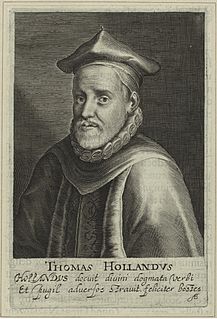
Lancelot Andrewes was an English bishop and scholar, who held high positions in the Church of England during the reigns of Elizabeth I and James I. During the latter's reign, Andrewes served successively as Bishop of Chichester, of Ely, and of Winchester and oversaw the translation of the King James Version of the Bible. In the Church of England he is commemorated on 25 September with a lesser festival.

John Marston was an English playwright, poet and satirist during the late Elizabethan and early Jacobean periods. His career as a writer lasted only a decade. His work is remembered for its energetic and often obscure style, its contributions to the development of a distinctively Jacobean style in poetry, and its idiosyncratic vocabulary.

Thomas Holland was an English Calvinist scholar and theologian, and one of the translators of the King James Version of the Bible.

The Long Turkish War or Thirteen Years' War was an indecisive land war between the Habsburg monarchy and the Ottoman Empire, primarily over the Principalities of Wallachia, Transylvania, and Moldavia. It was waged from 1593 to 1606 but in Europe it is sometimes called the Fifteen Years War, reckoning from the 1591–92 Turkish campaign that captured Bihać.
Thomas Winniffe (1576–1654) was an English churchman, the Bishop of Lincoln from 1642 to 1646.
John Dickenson was an English author, known as a romance-writer. He was a follower in the school of John Lyly and Robert Greene. He worked for a time in the Low Countries, and Germany. Employed by George Gilpin and Ralph Winwood, he may have been a spy, and certainly was an agent of the government on the ground at the time of the War of the Jülich succession of 1610. He was employed on further missions, in Poland and Scandinavia.
Events from the year 1663 in England.
Matthew Kellison was an English Roman Catholic theologian and controversialist, and a reforming president of the English College, Douai.
William Dakins was an English academic and clergyman, Gresham Professor of Divinity and one of the translators of the King James Bible.
Henry Rowlands (1551–1616) was a Welsh bishop of Bangor.
William Parker was an English captain and privateer, and also Mayor of Plymouth.
Sir William Wray, 1st Baronet, of Glentworth, Lincolnshire was an English Member of Parliament.
Sir Robert Lee was an English merchant who was Lord Mayor of London in 1602.

Sir Thomas Bennet was an English merchant and Lord Mayor of London in 1603-04.
George Ryves was an English academic administrator at the University of Oxford.
Edward Evans, was an English divine.
Edward Johnson was an English composer. Johnson's compositions were highly regarded in his time, but few of them survive.
Edward Meetkerke was an English clergyman and academic, Regius Professor of Hebrew at Oxford from 1620.
Thomas Moundeford M.D. (1550–1630) was an English academic and physician, President of the London College of Physicians for three periods.
Hugh Calveley, of Lea, Cheshire, was an English politician who represented Liverpool as a Member of Parliament in 1601 during the latter years of the reign of Elizabeth I. The surname is often misspelt as Calverley which is a Yorkshire based surname, distinct and not in any way connected. The correct spelling of the Cheshire family from which Sir High is descended is Calveley.
This page is based on this
Wikipedia article Text is available under the
CC BY-SA 4.0 license; additional terms may apply.
Images, videos and audio are available under their respective licenses.




